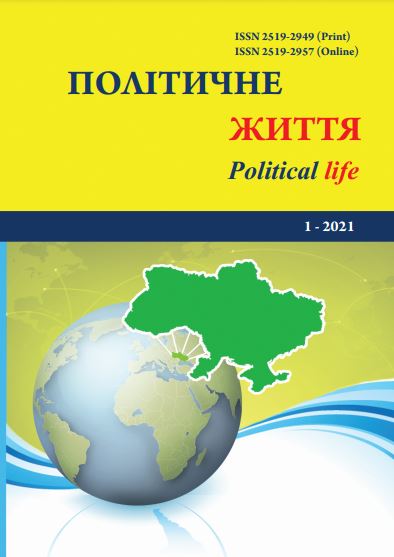The System of Control and Supervision over the US Special Services (the end of the XX – beginning of the XXI)
DOI:
https://doi.org/10.31558/2519-2949.2021.1.1Keywords:
Special Services; control; supervision; branches of power; public; democracy; security; confidentiality; transparencyAbstract
The experience of organizing and exercising control and supervision over the US Special Services under the conditions of challenges and threats to national security, defense and interests of the state at the end of the XX – beginning of the XXI century is analyzed and generalized.
It has been established that the US Special Services are within the limits and possibilities clearly outlined by national legislation under the close supervision and control of government institutions and the public defined by it. Such conditions allow them to professionally perform the tasks assigned to them within the framework of the legislative field of the state, allied and international obligations, respect for human rights and freedoms.
A specific feature of the functioning of the system of control and supervision over US Special Services is a clear division of areas of its implementation by independent branches of government with simultaneous supervision over them and Special Services by public organizations and independent institutions.
Somewhat more in terms of the number and scope of surveillance and control measures over the Special Services from other branches of government belongs to its executive branch – the president and the government.
Extremely large control powers have been vested in US law to the Director of National Intelligence (DNI), that in effect and scope is the second official over Special Services after the country’s president.
The role and place in the structure of the US Special Services of the Inspector General, who is appointed by the President, is unusual for Special Services of other countries, who subordinated and reports only to him. He is a member of DNI Directorate staff and conducts independent investigations, audit, inspections and special reviews of programs and activities of intelligence community (IC), the implementation of which is organized, lead and controlled by its head – the Director of National Intelligence.
It draws attention, despite the constant terrorist threats and challenges to US security, the principled approach of independent institutions, organizations and the public to the concern for compliance with human rights and freedoms by Special Services in the performance of professional tasks both, within the country and abroad.
References
Декларація про державний суверенітет України : Декларація України від 16.07.1990 № 55-ХІІ. Відомості Верховної Ради УРСР. 1990. (№ 31). С. 429.
Про національну безпеку США. Закон США від 18 вересня 1947 року. URL : https://uk.wikipedia.org/wiki/%D0%97%D0%B0% (1947) (дата звернення: 14.02.2021).
Пилипчук В. Г., Будаков М. О., Гірич В. М. Система організації управління і правового забезпечення діяльності спецслужб (досвід країн Європейського Союзу та Північної Америки) : анал. доп. Київ : НІСД, 2012. 56 с.
Надзор за деятельностью разведывательных служб : практ. пособ. / под ред. Г. Борна, Э. Уиллза. Женева : ДКВС, 2016. 240 с.
Основи демократичного цивільного контролю над сектором безпеки і оборони : навч.-мет. матер. / В. А. Ященко та ін. Київ : АртЕк, 2019. 106 с.
Доклад о пытках в тюрьмах ЦРУ шокировал мировую общественность. URL : https://rg.ru/2014/12/12/pytki.htm (дата звернення: 24.01.2021).
О ситуации с правами человека в ряде государств мира. URL : https://russiaeu.ru/sites/default/files/user/ MFA%20Report%20on%20Human%20Rights_RU.pdf (дата звернення: 20.02.2021).az

